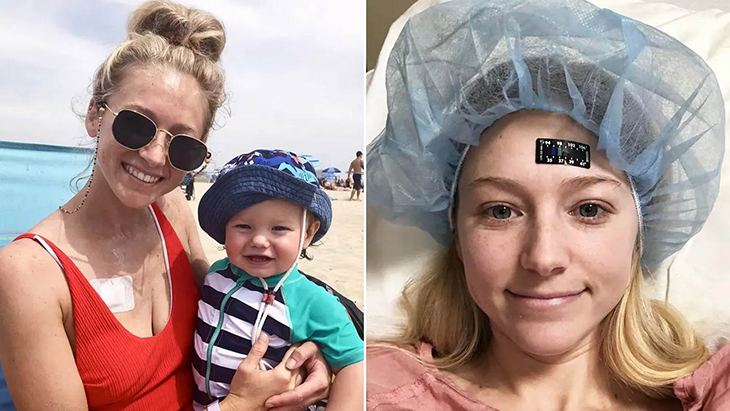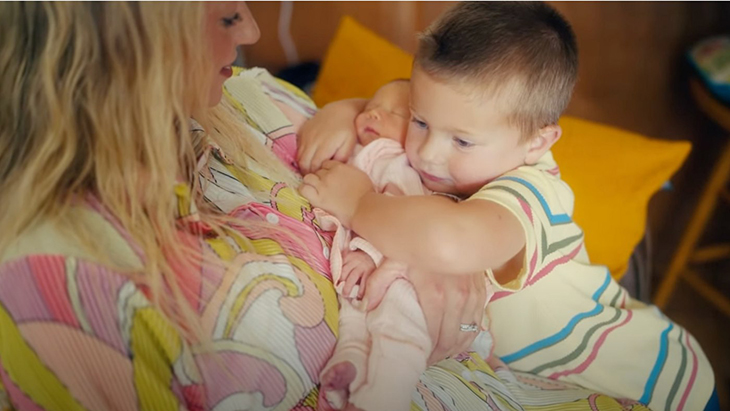Young Mom With Colorectal Cancer Given Experimental Treatment And Gets Second Chance For Baby Number 2

After less than a year of treatment with an experimental cancer drug, a young woman named Kelly Spill experienced the disappearance of her tumor and the resurgence of her hopes for having more children.
What should have been the happiest time of her life, following the birth of her first child, turned into a nightmare when she received a life-threatening cancer diagnosis.
Kelly Spill, a 28-year-old from New Jersey, was still recovering in the hospital with her newborn son, Chase, when she began experiencing troubling symptoms. Fatigue, bleeding, weight loss, and a loss of appetite were initially dismissed by her doctors as normal postpartum symptoms.
However, Spill had an unsettling intuition that something was seriously wrong. Her fears were confirmed when a colonoscopy revealed she had state-3 colorectal cancer.
Despite the grave diagnosis, Kelly’s primary concern wasn’t for her own life but the prospect of not being able to have more children. She and her husband had always dreamed of having at least three children. Determined to seek the best possible care, she chose to pursue treatment at Memorial Sloan Kettering Cancer Center in New York, renowned for its expertise in cancer treatment.
However, even here, she was informed that the treatment options were radiation, chemotherapy, and surgery. Her doctors warned that these treatments would significantly reduce her chances of ever having children, which she found “really hard to hear at just 28 years old.”
A radiation oncologist at City of Hope Cancer Center in California, Dr. Amanda Schwer, told Fox News Digital,“Radiation targeted at, or absorbed by, a woman’s reproductive organs can affect fertility, as can chemotherapy, which may cause women to lose fertility-related hormones.”
Fortuitously, just a day before she was scheduled to begin chemotherapy, Kelly received unexpected news. Members of the SU2C Colorectal Cancer Dream Team, a research group at Memorial Sloan Kettering, informed her that she qualified for a clinical trial involving a new drug, dostarlimab.
This drug, an immunotherapy agent, held the promise of treating her cancer without the severe side effects associated with traditional treatments.
“All I knew at that time was that the side effects of this immunotherapy would be a lot less harsh on my body than chemotherapy, and I would have a chance of a better quality of life—and maybe even another baby,” Spill said.
Immunotherapy, a revolutionary approach in cancer treatment, has been gaining traction since the technology behind it was awarded a Nobel Prize over half a decade ago. These drugs harness the body’s immune system to combat cancer cells more effectively. Kelly was only the fourth person to receive dostarlimab, which she took as an injection every week for six months.
Spill was just the fourth person to ever receive dostarlimab – which she took as an injection every week for six months. After her fourth treatment, Spill got the news – her tumor had shrunk to half its original size.
Remarkable progress followed. After just four treatments, her tumor had reduced to half its original size. This significant shrinkage provided a glimmer of hope.

“By the ninth treatment, my tumor had completely disappeared, which was extremely exciting,” she said.
Kelly had previously frozen an embryo as a precaution before starting cancer treatment, and while her initial thought was to try for another child immediately, she heeded her doctor’s advice to wait two years to ensure the cancer did not return.
Those two years passed without any sign of cancer recurrence. In July 2023, Kelly gave birth to a healthy baby girl named Mya Grace, a testament to her resilience and the effectiveness of the treatment. She remains cancer-free to this day, living proof of the potential of new cancer therapies to not only save lives but also preserve the dreams and futures of patients.
Kelly’s story highlights the profound impact that advancements in medical research and treatments can have on individual lives. It underscores the importance of continued innovation in cancer therapy, which offers hope and tangible benefits to patients worldwide.
As research continues, it is likely that more patients will have access to life-saving and life-affirming treatments like the one that helped Kelly Spill, transforming dire diagnoses into stories of triumph and new beginnings.



